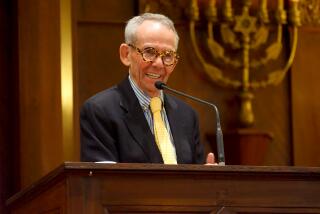Malcolm Cowley; Essayist Chronicled Literary History
- Share via
Author and literary historian Malcolm Cowley, whose influential and elegant essays chronicled more than six decades of American letters, died Tuesday after an apparent heart attack.
Cowley, 90, was stricken at his home in Sherman, Conn., medical officials said, and died later at a hospital in nearby New Milford.
As literary editor for the New Republic from 1929 to 1944, Cowley’s lead review “brought to focus for people to whom this page . . . represented the most dramatically satisfying confrontation of a new book by a gifted, uncompromising critical intelligence,” critic Alfred Kazin wrote.
Cowley was one of what Gertrude Stein called the “Lost Generation” of expatriate American writers in Paris after World War I--a group that included Ernest Hemingway and F. Scott Fitzgerald.
With a firmly grounded confidence in his own judgment, he recognized the brilliance of that generation. His “Portable Faulkner,” published in 1946, is credited with rescuing the novelist from obscurity. Within a few years, Faulkner won the Nobel Prize for literature.
“Cowley was a living bridge, both in his genial person and his engaging, shrewd criticism, with the generation that were young in the ‘20s,” author John Updike said in a statement. “His reactions to and perceptions of Hemingway, Fitzgerald, Faulkner and (John) Dos Passos are invaluable. He was an energetic and gregarious man who lived the life of the mind with gusto and good nature.”
Born Aug. 24, 1898, in Belsano, Pa., Cowley attended what he called “dreadfully snobbish” Harvard University for two years before leaving in 1917 to become an ambulance driver in France.
Cowley returned to Harvard in 1918 and graduated cum laude in 1920.
Although he would have preferred to work on his poetry, necessity forced him to take free-lance writing assignments to support himself after graduation.
A fellowship allowed him to study French literature for two years in France, where he became part of the enormously gifted circle of American writers living in Paris.
He returned to the U.S. in 1923, and began compiling his poems with encouragement from his friend, Hart Crane. Six years later, critics celebrated the collection of 56 poems, “Blue Juniata.” Cowley regarded the publication of his poems as the end of his literary apprenticeship.
“As a document of the first post-war generation, it is unique,” critic Allen Tate said of the collection. “Cowley’s generation appeared after the war had given the ‘genteel tradition’ and the provincial ways of life in America a staggering blow.”
Cowley’s “Exile’s Return: A Narrative of Ideas,” the book for which he is best known, deals with 1920s writers who naively attempted to pursue art as a way of life in Paris and Greenwich Village.
Along with his writing, Cowley had brief brushes with academia--teaching a semester at various universities, including Stanford and UC Berkeley.
He looked at creative writing teachers who had spent their entire careers on a campus with a wary eye. “They teach creative writing and they never do anything,” he said.
In 1956, Cowley published his 18 years of correspondence with Faulkner. In 1967, he produced a collection of his essays and reviews from the New Republic and other periodicals. He published a “A Second Flowering: Works and Days of the Lost Generation,” in 1973.
Cowley is survived by his wife, Muriel; one son, Robert, of New York; four grandchildren and two great-grandchildren.
More to Read
Sign up for our Book Club newsletter
Get the latest news, events and more from the Los Angeles Times Book Club, and help us get L.A. reading and talking.
You may occasionally receive promotional content from the Los Angeles Times.







